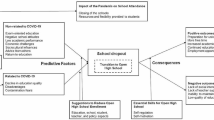Abstract
Latino student dropout is a national concern that must also be addressed strategically in local communities. Although national studies are important for pointing out areas of concern, local studies can provide more specific information for local policy development and implementation. This paper presents an example of local community-initiated needs assessment that addresses issues of Latino access to education. Focus groups and interviews were held with Latino students, parents, and community leaders as well as teachers and administrators. Issues and strategies of the needs assessment process are presented, which include involving key stakeholders, engaging community members as research partners, and engaging school personnel. General findings are presented and linked to accomplishments of the needs assessment process, such as increasing community awareness of issues and building commitment to implement strategies identified to reduce Latino student dropout.
Similar content being viewed by others
REFERENCES
Batsche, C., Hernandez, M., & Montenegro, M. C. (1999). Community needs assessment with Hispanic, Spanish-monolingual residents. Evaluation and Program Planning, 22, 13-20.
Bertrand, J. T., Brown, J. E., & Ward, V. M. (1992). Techniques for analyzing focus group data. Evaluation Review, 16, 198-209.
Children's Board of Hillsborough County. (1993). The countywide perspective (Social Indicator Report No. 1). Tampa, FL: Author.
Curtis, K. A. (1989). Help from within: Participatory research in a low-income neighborhood. Urban Anthropology, 18, 203-217.
Fine, M. (1991). Framing dropouts: Notes on the politics of an urban public school. Albany, NY: State University of New York Press.
Florida Department of Education, Education Information and Accounting Services. (1999). tDropout rate by district 1993-94 through 1997-98. Retrieved March 18, 2002, from the World Wide Web: http://www.firn.edu/doe/bin00014/droco-1.htm
Greenbaum, S. D. (1998). The role of ethnography in creating linkages with communities. In M. Hernandez & M. R. Isaacs (Eds.), Promoting cultural competence in children's mental health services (pp. 119-132). Baltimore, MD: Paul H. Brookes.
Greene, J. C. (1987). Stakeholder participation in evaluation design: Is it worth the effort? Evaluation and Program Planning, 10, 379-394.
Gutierrez-Mayka, M., & Contreras-Neira, R. (1998). A culturally receptive approach to community participation in system reform. In M. Hernandez & M. R. Isaacs (Eds.), Promoting cultural competence in children's mental health services (pp. 133-148). Baltimore, MD: Paul H. Brookes.
Hillsborough County School District, Division of Technical, Career and Adult Education. (1999). Secondary school leavers: School year 1997-98 Tampa, FL: Author.
Hughes, D., and Dumont, K. (1993). Using focus groups to facilitate culturally anchored research. American Journal of Community Psychology, 21, 775-806.
Kretzman, J. P., & McKnight, J. L. (1993). Building communities from the inside out: A path toward finding and mobilizing a community's assets. Evanston, IL: Center for Urban Affairs and Policy Research, Neighborhood Innovations Network, Northwestern University.
Krueger, R. A. (1994). Focus groups: A practical guide for applied research. Thousand Oaks, CA: Sage.
Latino Coalition. (1999). They are our kids: Findings of the Latino dropout study. Tampa, FL: Children's Board of Hillsborough County.
Marin, G., & Marin, B. V. (1991). Research with Hispanic populations. Newbury Park, CA: Sage.
Morgan D. L. (1988). Focus groups as qualitative research. In Sage university paper series on qualitative research methods (Vol. 16, pp. 46-66). Beverly Hills, CA: Sage.
Nieto, S. (2000). Puerto Rican students in U.S. schools. Mahwah, NJ: Erlbaum.
Patton, M. Q. (1990). Qualitative evaluation and research methods. Newbury Park, CA: Sage.
President's Advisory Commission on Educational Excellence for Hispanic Americans. (1994). Our nation on the fault line: Hispanic American education. Washington, DC: White House Initiative on Educational Excellence for Hispanic Americans.
Que Pasa Hispanic Magazine of Florida. (2000). Que Pasa, 5.
Sasao, T., & Sue, S. (1993). Toward a culturally anchored ecological framework of research in ethnic-cultural communities. American Journal of Community Psychology, 21, 705-727.
Silverman, M., Ricci, E. M., & Gunter, M. J. (1990). Strategies for increasing the rigor of qualitative methods in evaluation of health care programs. Evaluation Review, 14, 57-74.
Solis, J. (1995). The status of Latino children and youth. In R. E. Zambrana (Ed.), Understanding Latino families: Scholarship, policy, and practice (pp. 62-81). Thousand Oaks, CA: Sage.
Torres-Guzman, M. E., & Martinez Thorne, Y. (2000). Puerto Rican/Latino student voices: Stand and deliver. In S. Nieto (Ed.), Puerto Rican students in U.S. schools (pp. 269-291). Mahwah, NJ: Erlbaum.
U.S. Census Bureau. (2000). Redistricting data: Summary file tables. Washington, DC: Author.
U.S. Department of Education, Office of Educational Research and Improvement. (2001). Dropout rates in the United States. Washington, DC: Author.
U.S. Department of Health and Human Services, Division of Community Prevention and Training, Office of Substance Abuse Prevention. (1992). Cultural competence for evaluators. Rockville, MD: Author.
Yin, R. K. (1984). Case study research: Design and methods. In Applied social research methods series (Vol. 5). Beverly Hills, CA: Sage.
Author information
Authors and Affiliations
Corresponding author
Rights and permissions
About this article
Cite this article
Hernandez, M., Nesman, T.M. Issues and Strategies for Studying Latino Student Dropout at the Local Level. Journal of Child and Family Studies 13, 453–468 (2004). https://doi.org/10.1023/B:JCFS.0000044727.93261.05
Issue Date:
DOI: https://doi.org/10.1023/B:JCFS.0000044727.93261.05




